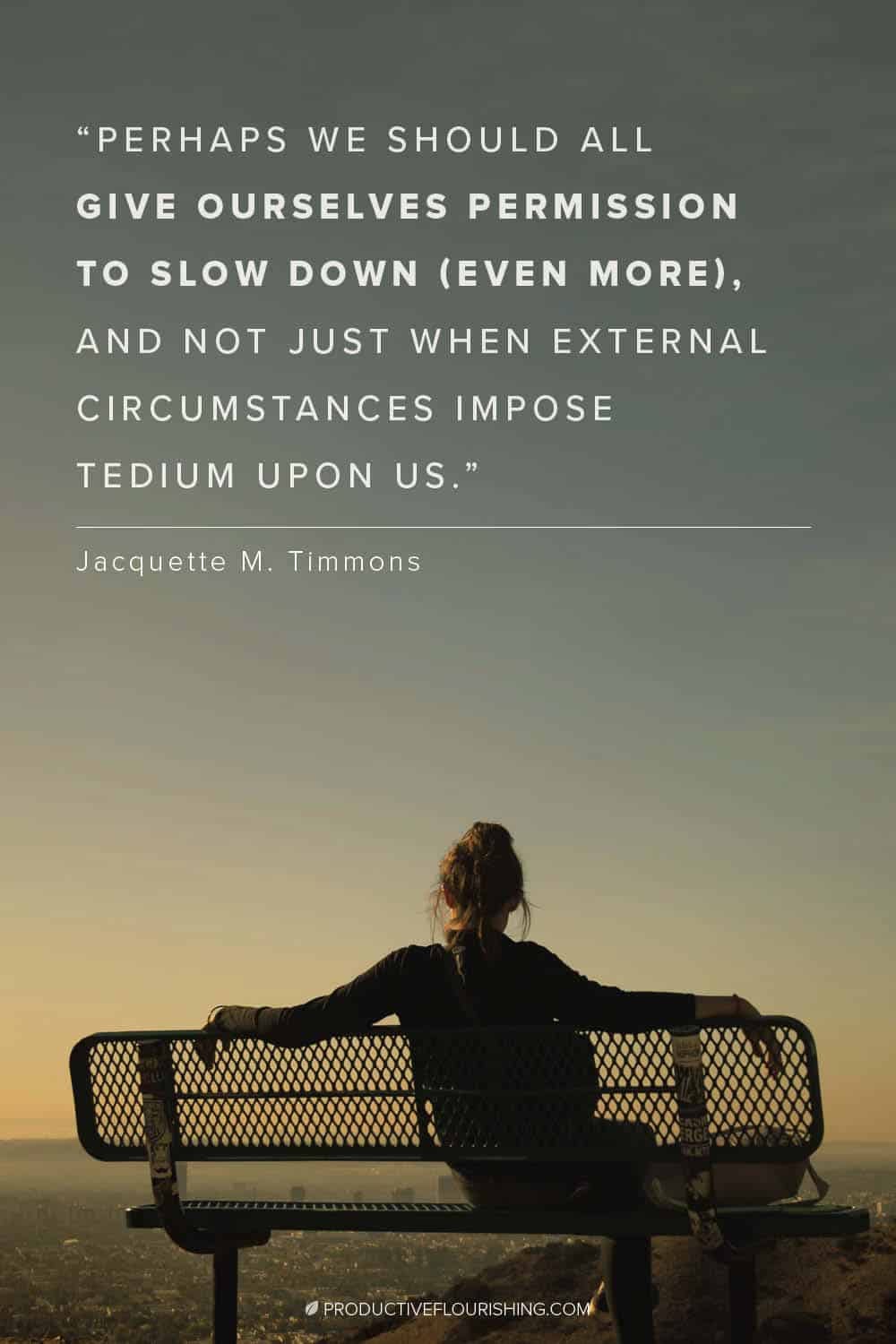How to See Tedium as Valuable

Editor’s note: This is a guest post by Jacquette M. Timmons.
We are almost four weeks into the new year. This is the time of the year that tends to bring about a renewed energy, excitement, and sense of self-empowerment. These are otherwise known as a few of the key ingredients needed to bring some urgency to making your dreams come true, to changing some habits (finally!), and to achieving those goals that repeatedly feel (and fall) slightly out of reach.
This time of year represents a fresh start, the kind that can foster thinking that has you gleefully saying, “This is it!”
“It” represents two things: (a) the moment when you finally (re)commit to the emotional and behavioral shift your dream, habit, or goal requires, and (b) the success and happiness you believe inevitably awaits you on the other side of where you are right now.
So, this time of year is ripe with enthusiasm. The evidence: You have a plan. The scope is clear, as are the tasks and activities.
But very soon (if research proves right), you’re going to hit a wall. Something is going to interrupt your flow and slow down your momentum. Maybe just temporarily, however, there is a strong possibility that it could derail you for the rest of the year. (Hence, the stats about resolution drop-off.)
That “something” could be from anything as banal as a schedule change that messed up your new exercise routine to something even more unsuspecting and less trackable: tedium!
The thrill is gone. The excitement of starting something new, making changes and working your plan has faded.
I started thinking about tedium during, of all things, jury duty. If you’ve ever been called to serve you might be able to relate. And if you live in New York City like I do, I know you can relate. Jury duty is quite a slow and grueling process, one with a lot of down time where your only activity is...waiting for something to happen.
In my role as a behavioral-based financial coach and speaker, my job is to connect dots and make, at times, non-obvious parallels between dissimilar things. So I’m always on the look-out for patterns.
One appeared during — you guessed it — jury duty. With so many hours spent waiting and thinking, I started to draw parallels between jury duty and project management, especially as they regard the project of managing money and professions (whether that is as an entrepreneur, small business owner, or employee). With either one, jury duty or project management, you’re constantly waiting for something to happen, be it an investment to pay off, a new prospect to come on board, or a pitched proposal to be accepted.
I wanted to share a few of my jury duty observations with you. What I found frustrating and fascinating about jury duty is useful feedback that you and I ought to keep top of mind regarding the “project management” of our money and our professions. This is especially true as January quickly becomes February, and the “February Effect” kicks in. It’s my hope that the observations that follow will help you stay on track and quickly get you back on it when you get derailed. PRODUCTIVE FLOURISHING
Tedium
I know I sound dramatic when I say jury duty is grueling, but that is precisely how it feels. It’s exhausting because absolutely nothing happens fast. Everything from getting through security (slow), to transitioning from the larger jury pool to the smaller one where you’re questioned as a potential juror for a case (even slower), to learning whether you’ve been selected for a case or released from service (even more slowly) slugs along.
But jury duty is slow and deliberate for a reason. Each step is part of a larger system that involves multiple players. Moving slowly ensures all the players and all the parts are working together well in real-time. And as best it can, the rules of the system are designed to protect all the parties involved—jurors, judges, attorneys (prosecutors and defense), and defendants.
If someone was reviewing the project plan you prepared for your new year’s resolutions (or goals, if you prefer), would they be able to discern the points where you were intentionally planning to slow down and assess your progress?
In a culture where we laud fast — fast decisions, fast growth, quick results — being slow and deliberate is not always celebrated. But maybe they should be. Perhaps we should all give ourselves permission to slow down (even more), and not just when external circumstances impose tedium upon us. (Tweet this.)
Check, and Check Again
When I was on jury duty, I was amazed at how many times things were double checked and how many people were documenting the same information. The checks and balances seemed to increase once you left the larger jury pool. Talk about a process designed to minimize human error when so much is on the line! There are examples I’d love to give, but I can’t. But more important than any examples are these questions for you: What’s on the line for you? What is that resolution or goal really, really about? And what are your checks and balances?
Maybe your check-in or project review doesn’t require minimizing human error so much. But does its intent go beyond just checking on your progress and results? Does it ensure you’re not conflating project tasks with project scope and any movement with beneficial activity (i.e., busy vs. productive)?
Silence Doesn’t Mean Inactivity
Speaking of activity — there were so many times I caught myself thinking, “...this is so disorganized…” But what eventually became clear is that what appears to be chaos to me, an outsider, is actually order for those within the court system.
My sentiment about “chaos” stemmed in large part because of the activity I couldn’t see and information to which I was not privy. I didn’t know about what was going on behind the scenes. Plus, there were some things I couldn’t know due to my status. I was no longer in the larger jury pool, but I hadn’t yet been sworn in as a juror for a specific case. Also, certain matters were discussed in side-bars.
But just because the process didn’t comport to my sense of order didn’t mean stuff wasn’t happening.
When you don’t hear from the key players you’ve tapped to help you fulfill your dreams, change your habits, and achieve your goals, or when they haven’t yet passed along information from other decision makers within your preferred timeline, what is your default presumption? Do you presume they aren’t doing anything? Or will you trust that the process (including your follow-up process) is working?
Is Boring the New Good?
“I can’t wait to be called for jury duty!” said no one ever. But I’m huge on civic duties, so I believe jury duty is important and an honor. And yet, the process still felt tedious (and strangely fascinating!).
Truth is, there will be times throughout the coming year where working on your project plan (money and/or professional) is going to feel tedious. Instead of receiving that as a point of discouragement, view it as an invitation.
First, use the tedium to examine your check and balances. Yes, to minimize human error, but also to make sure you’re tracking the right details, tasks, and scope.
Second, I hope you’ll come to see the moments when tedium kicks in as valuable. Jury duty entails a lot of waiting for something to happen, and it reminded me that waiting is a useful form of activity. Sure, there will be times when external circumstances will “force” tedium upon you. But what’s better is deliberately slowing down and looking for connections and patterns you may otherwise be tempted to dismiss because you were too busy to wait.





